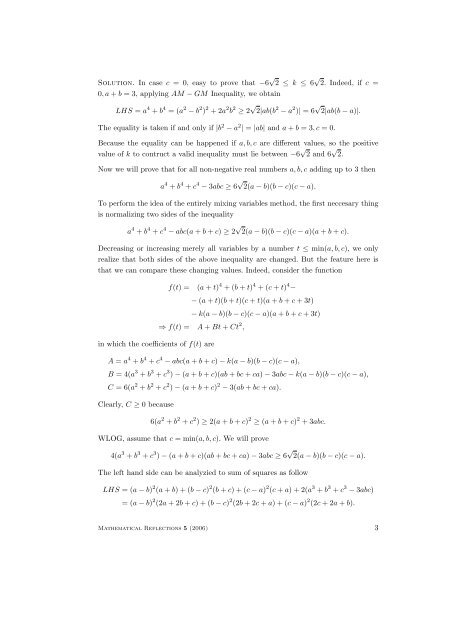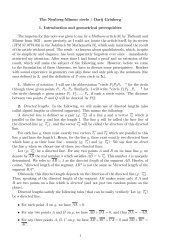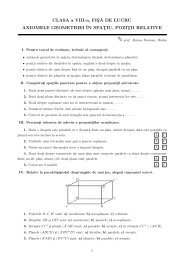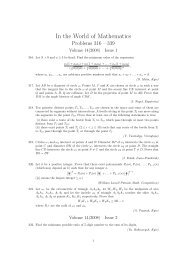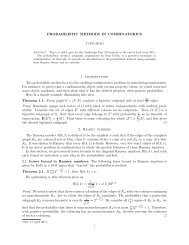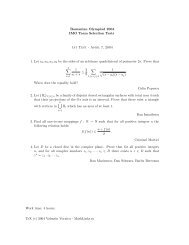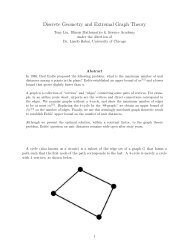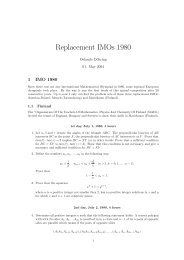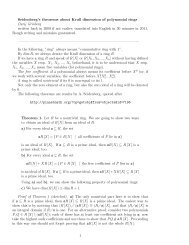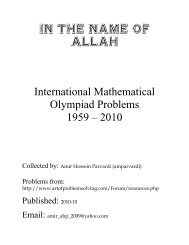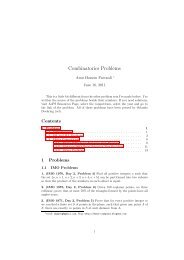The entirely mixing variables method
The entirely mixing variables method
The entirely mixing variables method
You also want an ePaper? Increase the reach of your titles
YUMPU automatically turns print PDFs into web optimized ePapers that Google loves.
Solution. In case c = 0, easy to prove that −6 √ 2 ≤ k ≤ 6 √ 2. Indeed, if c =<br />
0, a + b = 3, applying AM − GM Inequality, we obtain<br />
LHS = a 4 + b 4 = (a 2 − b 2 ) 2 + 2a 2 b 2 ≥ 2 √ 2|ab(b 2 − a 2 )| = 6 √ 2|ab(b − a)|.<br />
<strong>The</strong> equality is taken if and only if |b 2 − a 2 | = |ab| and a + b = 3, c = 0.<br />
Because the equality can be happened if a, b, c are different values, so the positive<br />
value of k to contruct a valid inequality must lie between −6 √ 2 and 6 √ 2.<br />
Now we will prove that for all non-negative real numbers a, b, c adding up to 3 then<br />
a 4 + b 4 + c 4 − 3abc ≥ 6 √ 2(a − b)(b − c)(c − a).<br />
To perform the idea of the <strong>entirely</strong> <strong>mixing</strong> <strong>variables</strong> <strong>method</strong>, the first neccesary thing<br />
is normalizing two sides of the inequality<br />
a 4 + b 4 + c 4 − abc(a + b + c) ≥ 2 √ 2(a − b)(b − c)(c − a)(a + b + c).<br />
Decreasing or increasing merely all <strong>variables</strong> by a number t ≤ min(a, b, c), we only<br />
realize that both sides of the above inequality are changed. But the feature here is<br />
that we can compare these changing values. Indeed, consider the function<br />
f(t) =<br />
(a + t) 4 + (b + t) 4 + (c + t) 4 −<br />
− (a + t)(b + t)(c + t)(a + b + c + 3t)<br />
− k(a − b)(b − c)(c − a)(a + b + c + 3t)<br />
⇒ f(t) = A + Bt + Ct 2 ,<br />
in which the coefficients of f(t) are<br />
A = a 4 + b 4 + c 4 − abc(a + b + c) − k(a − b)(b − c)(c − a),<br />
B = 4(a 3 + b 3 + c 3 ) − (a + b + c)(ab + bc + ca) − 3abc − k(a − b)(b − c)(c − a),<br />
C = 6(a 2 + b 2 + c 2 ) − (a + b + c) 2 − 3(ab + bc + ca).<br />
Clearly, C ≥ 0 because<br />
6(a 2 + b 2 + c 2 ) ≥ 2(a + b + c) 2 ≥ (a + b + c) 2 + 3abc.<br />
WLOG, assume that c = min(a, b, c). We will prove<br />
4(a 3 + b 3 + c 3 ) − (a + b + c)(ab + bc + ca) − 3abc ≥ 6 √ 2(a − b)(b − c)(c − a).<br />
<strong>The</strong> left hand side can be analyzied to sum of squares as follow<br />
LHS = (a − b) 2 (a + b) + (b − c) 2 (b + c) + (c − a) 2 (c + a) + 2(a 3 + b 3 + c 3 − 3abc)<br />
= (a − b) 2 (2a + 2b + c) + (b − c) 2 (2b + 2c + a) + (c − a) 2 (2c + 2a + b).<br />
Mathematical Reflections 5 (2006) 3


